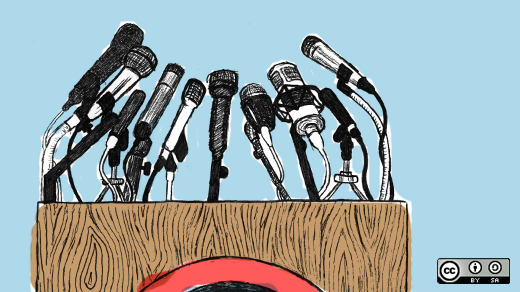Faced with unfavorable media coverage of their organizations, some leaders might fire those who talk to reporters. After all, informants are sharing the organization's inner workings in a way that makes them look bad. This can draw the wrath of customers, legislators, and—most importantly for some—shareholders.
But what if leaders viewed this situation differently?
What if they treated these moments not as a problem for the company, but as something indicative of a problem with the company?
This shift in perspective might reveal something about the relationship between transparency, accountability, and trust in our organizations.
Think about it this way: You hire people because you hope they'll contribute to your company. Hiring someone is an act of trust that extends in multiple directions. Yes, trust can be misplaced at times—but if the people in your organization feel the need to talk to the press about the inner workings of your company, consider the possibility that they've felt that trust has been violated and are acting in what they believe to be the most ethical manner the circumstances permit. You trusted these people enough to bring them into your organization, so you should assume positive intent.
The folks in your organization aren't just members of your organization. They're members of many organizations—churches, families, social clubs, sports fandoms, etc.—and of society more broadly. This means they evaluate ethical decisions not just in the context of their role in your organization, but in a larger context that takes their whole selves into account. If your organization is behaving in a way that an employee perceives as harmful to external organizations they care about (or is in conflict with the values and ethics those additional organizations espouse), it's reasonable to suspect they'll blow the whistle. This could mean escalating the conversation to your management, reporting to a government oversight body, or speaking with members of the press.
As a leader of an organization that strives to be ethical (and of course your organization does), consider what these signals are telling you. And consider what your response will do.
If your organization is behaving unethically and you fire the people who are letting others know it, does that action correct or stop the unethical behavior? Of course it doesn't.
Furthermore, it signals to the organization that you don't actually want to hear what's wrong. You'd rather destroy any sense of accountability that may have existed in your organizational culture. And in doing so you'll drive more people to expose the behavior of your organization. "The more you tighten your grip," open leadership expert Leia Organa said, "the more star systems will slip through your fingers."
Ethics aren't universal; people can (and do) disagree on whether particular actions are ethical. And of course, you may find many valid reasons for firing someone who's gone to the press (disclosing confidential financial information is one example). But if someone is talking to a reporter because they think you're doing the wrong thing, take a lesson from it.
Nobody likes being told they're doing wrong, particularly if they don't think they are doing something wrong. But leadership in an open organization requires a willingness to hear this. It requires building a culture of accountability where members feel safe calling out what they see as unethical behavior, even—and especially—from senior leaders. If members of your organization are going to the press instead of you, that says more about the culture you've built than it does about them.







3 Comments